Realistic ‘Tukaram’ is a work of art
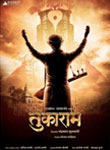 |
Rating: na
Banner: Everest Entertainment Producer: Sanjay Chabria Director: Chandrakant Kulkarni Story: Ajit Dalvi, Prashant Dalvi Cinematographer: Rajan Kothari Editor: Ballu Saluja Cast: Jeetendra Joshi, Veena Jamkar, Ravindra Mankarni, Madhav Abhyankar, Radhika Apate, Sharad Ponkshe, Pratiksha Lonkar, Yatin Karyekar Movie Review by: Ulhas Shirke |
The reality behind the popularity of the literature of Sant Tukaram, the 17th Century saint and poet from Maharashtra was his thought provoking literature. It has been translated into 10 European languages, which itself speaks about his selfless service. In the year 1936, a Biopic made by Prabhat Film Company on this well known Saint, had invited attention from all over the world and the film was the first Indian film to receive award at 5th Venice International Film Festival. The film still remains popular and is subject of frequent studies.
Today, when people have turned to materialistic living, producer Sanjay Chaberia has dared to produce a Biopic on the famous saint, under the direction of Chandrakant Kulkarni and on the script of Ajit Dalvi and Prashant Dalvi. This film focuses on his life before sainthood, trying to cover his childhood with his family and later assisting his father in his traditional money lending business. Very cleverly, the director has tried to show the maturity of young Tukaram in understanding the poverty in his village, during drought and still managing to maintain a balance between his business minded father and the defaulters,using his diplomacy.
The film also goes on to show, how during that period of 17th century, the elders forced their children for second marriage, if the first wife failed to conceive. So, we find a firebrand young woman- Avali walking into the life of Tukaram in presence of his first wife Rakhma, who willingly agrees for the same, to make her mother-in law happy. Initially, Tukaram is not fully devoted to Lord Vitthal; as much as his brother Savji . In fact, as a child, he poses question to his father, as to why he has to travel on a pilgrimage in the form of ‘Vaari’ every year, to seek blessings of Lord Vitthal, when there is already a temple of the same Lord in their village.
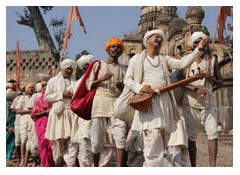
A little before interval, the film shows the transformation of Tukaram into Saint Tukaram, when he leaves his house in search of peace and happiness for all those who suffer the drought conditions. The Saint’s poems and his Kirtans( devotional songs) gather support from devotees from different places, including Bramhmins. This disturbs some of the selfish Bramhins, who demand respect to their profession and feel that no other person from a lower caste has the right to offer kirtans. So, Tukaram is tried in the court of so called religious leaders; and asked to destroy his collections and prevented from writing any more lyrics. The caste discrimination occurring those days, is clearly shown through some of the scenes. But, the popularity of the Saint gathers support from the places around and the Saint is forced to break his 13 day fast.
Director Chandrakant Kulkarni has covered most of the important events in the life of the Saint Poet, starting with his childhood days, his young days, while assisting in his father’s business, post marriage tragic events faced by the family and later his turning towards devotion to God and selfless service to the society. The incidences of his advice to Bahinabai a Varkari female, who later turned a saint from Maharashtra, his encouragement to brave young man from village- Laxman, to join the force of Shivaji Maharaj and also his interaction with the Great Maratha Warrior, have been well captured. The wonderful photography by Rajan Kothari makes the film more appealing, with the proper selection of ideal locations and costumes.
Jitendra Joshi who portrays the popular saint, simply steals the show with his remarkable performance. His body language, dialogue delivery and changing expressions according to the situations, test his tremendous capacity as an actor. Sharad Ponkshe as Bolhoba Ambile More (Tukaram’s father) and Pratiksha Lonkar as Kanakai (Tukaram’s mother), impress with their astonishing performances. Veena Jamkar playing his first wife Rakhma and Smita Tambe playing his sister-in-law, have displayed their talents through those few emotion filled scenes, they have to their credits. Yatin Karyekar as Mambaji Gosavi, the orthodox Bramhin, succeeds in creating an impact through his negative role. Radhika Apte in the role of Aaavli, the saint’s second wife sounds very loud; but that must be going with the requirement of the script. She too has done a good job in the company of artistes like Vikas Patil, Madhav Abhyankar, Ravindra Mankani and others. Padmanabh Gaikwad as young Tukaram has also done a good job. This biopic, is a real tribute to the great saint of Maharashtra.
‘Tukaram’ is a timely release, when we find our own country’s administration surrounded by corrupt practices and the people of today getting used to such practices. Presenting the thoughts of the Saint into a cinematic format and reminding the message behind his meaningful lyrics, with suitable music compositions, this realistic film has turned out to be a real work of art.
‘Jai Jai Maharashtra Majha’ salutes Marathi culture
 |
Rating: na
Banner: Amanora, Sanjay Ghodawat Groups Producer: G. J. Creation Director: Gautam Joglekar Story, Screenplay, Dialogues: Gautam Joglekar Cinematographer: Ganesh Sankla, Ajit Raddys. Music: Yashwant Dev, K C Loy, Ajit Parab, Gautam Joglekar Cast: Mahesh Manjrekar, Mrunal Kulkarni, SIddharth Chandekar, Hemant Dhome, Aditi Govitrikar, Yatin Karyekar, Anusha Dandekar Movie Review by: Ulhas Shirke |
Gautam Joglekar has a strong background of film and stage; having been blessed by renowned personalities like Sai Paranjape and Arun Joglekar. As an actor, we saw very little of him; but as a film maker, he proved his ability through his first film ‘Pak Pak Pakak’. This time he strikes with something big in the form of ‘Jai Jai Maharashtra Majha’ a commercial Marathi film with music and Marathi culture as its base. The story of the film revolves around one of the leading tennis players in the world -Ashwini Stevenson (Anusha Dandekar), who is on a short trip to her motherland.
Having been deserted by her biological mother after her birth, Ashwini is adopted by her American mother from a children’s home in Pune, when she was just four years old. After attaining a celebrity status, she does not forget the culture of her birthplace and does her duty by donating 10% of her earnings towards charity. On her short visit to Maharashtra, she is a guest of Royal Mohite family from Kolhapur. They depute their young son Vishal (Hemant Dhome) to receive her and take her around tourist places on their way to Kolhapur from Mumbai. Among many other experiences, she is also invited as a special guest at the children’s home, where she has spent her early childhood.
During this short journey, Ashwini comes across a TV anchor (Aditi Govitrikar), a trainee Journalist- Rajat and his parents Dilip & Amruta Rege ( Mahesh Manjrekar & Mrinal Kulkarni). Ashwini is a fun loving young girl who loves to be part of the traditional festival and food in India, but Vishal is over protective about her food and is constantly accompanying her,during her short trip as her guide. He falls in love with her and Ashwini too loves his innocence. When Ashwini lands in Pune, she is shocked to discover the presence of her real mother around.
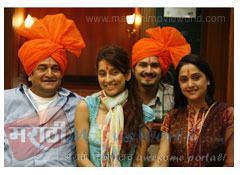
At the stroke of interval, the audience also becomes aware of the reality, besides Ashwini, who hates her biological mother for having deserted her, after her birth. Director Gautam Joglekar has tried to link the sequences with flashback, to reveal the truth behind the happenings of the past. The electronic media goes after the story, with the rival channels competing with each other trying to cover different angles. But, as the film’s story moves on, we find the breaks in the form of songs offering good music by four different music composers. The film concludes with a happy ending, when Ashwini gets ready to return back.
‘Jai Jai Maharashtra Majha’ has tried to offer a different type of entertainment with a new subject, with special emphasis on the culture of Maharashtra. Very cleverly, the director has tried to use his sponsors, during Ashwini’s trip to Pune, supported by a song; suggesting the importance of the historical city. With the inclusion of Mahesh Manjrekar and Mrinal Kulkarni, he has tried
to make the film emotion filled and at the same time he moves simultaneously with the fun loving pair of Hemant and Anusha.With the help of Siddharth, he has offered a character of a confused son, whose mother suffers from a neurological disorder. There are many other characters in the film, who form a big team to bring some relief to the serious subject.
What makes the film more interesting, is its presentation. There is no doubt that all the artistes have responded well through their respective characters. But, without the excellent camera work, perfect editing and good music, it would have turned out to be a serious tale. Both Mahesh Manjrekar and Mrinal Kulkarni have given their best performances, with a perfect understanding between them for every scene. Siddharth Chandekar displays his skills through his emotions as and when he got an opportunity. Anusha Dandekar is the perfect choice for the role of Ashwini, because of her accent and looks. She impresses in that role. But, it is Hemant Dhome, who in the lead role of Vishal Mohite has invited all the attention. He is simply superb!
The film does have few drifts; like inclusion of four friends of the hero and a song sequence with them and the unnecessary sting operation by a TV channel, involving Amruta and Ashwini . These are not ethical practices, at least by Marathi news network. But, barring these few scenes, the film has tried to present something sensible to the Marathi viewers. ‘Jai Jai Maharashtra Majha’ is a film for all, who respect Marathi culture.
‘Kaksparsh’ presents a realistic tale
4.0
User Rating
( votes)
|
 |
Banner: Great Maratha Entertainment L.L.P.
Producer: Aniruddha Deshpande, Medha Manjrekar Director: Mahesh Manjrekar Story: Based on real story for Usha Datar, re-written by Girish Joshi Screenplay: Girish Joshi Cinematographer: Ajit Reddy, Abhishekh Vijaykar Cast: Sachin Khedekar, Priya Bapat, Sanjay Khapare, Abhijit Kelkar, Manva Naik, Medha Manjrekar, Savita Malpekar, Vaibhav Mangle, Ketki Mategaonkar, Saksham Kulkarni, Kishor Raorane, Gauri Ingawale, Saiee Manjrekar Movie Review by: Ulhas Shirke |
Film maker Mahesh Manjrekar’s latest Marathi film ‘Kakasparsha’ takes you into pre independence era, to narrate the tale of Haridada (Sachin Khedekar) and his family living in a village in Konkan, Maharashtra. Those were the days, when girls used to get married even before attaining puberty. Haridada gets his younger brother Mahadeo (Abhijit Kelkar) married to one such girl Durga (Ketaki Mategaonkar) approved by his associate Balwant (Sanjay Khapre) who is also close to girl’s family.
Durga turns Uma after marriage, on entering the disciplined house of Haridada, whom she respects a lot, besides liking him for his behavior and personality. When Mahadeo passes away at young age, while studying his law; the responsibility of Uma lies on the shoulders of Haridada and his family. Uma mixes up well with Haridada’s wife and children of Haridada and takes care of them, as she grows up with them.
As per the rituals in Brahmin family, Uma is supposed to shave off her head; after her husband’s death; but Haridada opposes to the demand of the Priests from village headed by Upadhyay (Vaibhav Mangale). When Haridada’s wife passes away, everybody expects him to marry Uma ( Priya Bapat, who plays the grown up Uma) and Uma too is willing for the same. But, Haridada refuses to do so; as he is committed to his promise given to soul of the departed, during the rituals observed on the 10th day after Mahadeo’s death.
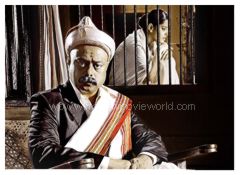
A time comes when Haridada stops talking to Uma and that hurts her. She stops eating. Everybody including Haridada’s elder sister, Haridada’s married children and younger sister all fail to persuade her. Finally, Haridada confesses the truth to Uma, stating as to why he kept himself away from her, though over protected her. He even agrees to marry her, breaking all his promises, only with the hope that she would give up her fast. But, the director tries to be realistic and ends the film, the way he wished to respect the original script of Usha Datar on the screenplay of Girish Joshi.
Shot on the backdrop of Konkan, Mahesh Manjrekar has perfectly selected the locations, including the traditional ancestral house, to create the atmosphere of the pre- independence era. Very cleverly, he has inserted the character of Balwant, who is also shown as a freedom fighter. The character of Upadhyay played by Vaibhav Mangale clearly suggests the dominance of orthodox Brahmins those days.
From beginning till the end, the film sticks to its subject, without any diversions and that makes the presentation more realistic. ‘Kakasparsha’ is the film for sensible film viewers. Fine performances from Sachin Khedekar, Sanjay Khapre, Ketaki Mategaonkar, Vaibhav Mangle, Priya Bapat, Abhijit Kelkar, Saksham Kulkarni and others, makes it more impressive. Music and background music have been handled well and so is the wonderful cinematography capturing all those natural moments.
Actor Sachin Khedkar deserves all the praise for his memorable performance through that lifetime role of Haridada. He gets a good support from all other artistes. Prominent among them are Sanjay Khapre and Vaibhav Mangle who have invited special attention.
‘Khel Mandala’ takes Marathi Movie to a greater height
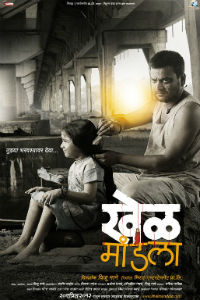 |
Rating: na
Banner: Amruta Productions, Mirah Entertainment Producer: Ashok Narkar Director: Viju Mane Story, ScreenPlay, Dialogues: Viju Mane Music: Chinar Mahesh Lyrics: Ashok Bagwe, Abhijit Panse, Viju Mane Cast: Mangesh Desai, Uday Sabnis, Ananya Devre, Urmila Kanetkar, Santosh Juvekar, Prasad Oak, Mansi Salvi, Kushal Bhadrike, Priya Marathe Movie Review by: Ulhas Shirke |
Script has been the success formula of Marathi films these days. New subjects with universal themes presented by Marathi movies now a days, are appealing not only the audience at the national level but also the world over. Viju Mane’s new Marathi film, ‘Khel Mandala’ can be counted in this category of exemplary films.
The film presents a poor simple villager- Dasu (Mangesh Desai) who comes to Mumbai along with his father(Uday Sabnis), as he feels that the puppet shows performed by his father have become outdated. The father is reluctant, but Dasu convinces him, suggesting that he would do some job, so that the old man could rest during his old age. He finds temporary shelter under a flyover bridge, but is unable to fulfill his father’s dream, as the old man is knocked down by a speeding truck.
Dasu decides to carry forward his father’s puppet shows . One day, he finds a new born baby girl left near his hut , during the riots. Dasu, who is all alone in this world, decides to take care of the child. He soon discovers that the baby girl is not only visually impaired but also dumb and deaf. He names her Bahuli. Already blessed with his father’s art, he uses threads tied to her to communicate with her. As Bahuli grows three year old, Dasu makes her dance like a puppet and earns for their living.
A TV Journalist Anushka (Urmila Kanitkar-Kothare) spots both of them during one such road show and makes a story for her breaking news. Her boyfriend (Santosh Juvekar) who belongs to rival channel, makes a different story out of this news, inviting Human Rights activist for a talk show to indicate that such an act is an exploitation of child, under Child labour act. In the meantime, Anushka discovers Bahuli’s real parents Sheetal & Sangeet (Manasi Salvi & Prasad Oak) and tries to hand over Bahuli to them. But, emotion filled Dasu is reluctant. Anushka tries to persuade him, stating that they would be able to offer treatment to Bahuli.
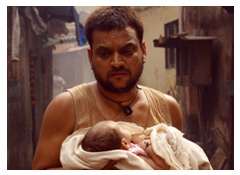
The film concludes with a tragic end, but it goes on to suggest the realities in human life. As a director Viju Mane has presented the character of Dasu in a sensible manner, showing his journey from a village to Mumbai and willing to do any work and adjust
himself in the so called dream city. He is the perfect choice for this role. His emotions are very cleverly captured by the camera, throughout the movie, especially in the climax. Urmila plays the committed TV News channel Journalist very effectively. At the same time, we witness a clever but cunning reporter in Santosh.
Both, Prasad and Manasi play the married couple efficiently. Manasi has more scope to prove her capacity through few emotion filled scenes, while Prasad plays a selfish husband, who later confesses his misdeed. Uday Sabnis has little to offer, but he has played his part well and so are the efforts put in by Arun kadam, Abhijit Chavan, Kushal Badrike and Priya Marathe – who plays the narrator. Child artiste Ananya plays the role of Bahuli as per director’s expectations. .
There are many touching emotion based scenes in the film; but one fails to understand the scenes, where Dasu falls asleep, holding Bahuli in his arms that too without tying her hands, while it rains and his body getting wet. Also, the dream scene where Dasu imagines Anushka as his companion to take care of Bahuli, does not go well. Barring these two scenes, director Viju Mane, has succeeded in his superb presentation, which certainly takes Marathi Movie to a greater height.
‘Masala’ offers a tasty recipe to Marathi audience
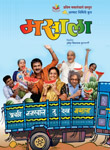 |
Rating: na
Banner: Aarbhat Nirmiti Producer: Umesh Vinayak Kulkarni, Girish Pandurang Kulkarni Director: Sandesh Kulkarni Story: Girish Pandurang Kulkarni Screenplay: Girish Pandurang Kulkarni Cinematographer: H M Ramachandra Halkere Cast: Girish Pandurang Kulkarni, Amruta Subhash, Dr. Moha Aagashe, Dilip Prabhavalkar, Hrishikesh Joshi, Sneha Majgaonkar, Srirang Mahajan, Shrikant Yadav, Gardi Fule-Thatte, Dr. Shreeram Lagoo, Jyoti Subhash Movie Review by: Ulhas Shirke |
As you always need a good combination of spices to bring a special flavor to a kitchen recipe; the same is applicable for a neat and clean feature film, before its final presentation. Only difference is that in the case of a film, it is the ingredients like story, screenplay, dialogues, performances, editing, cinematography, lyrics and music that should combine well to make a sensible film. Latest released Marathi film ‘Masala’ has that special flavor, well suited to its apt title.
The film revolves around the struggle of a young couple- Revan (Girish Kulkarni) and Sarika (Amruta Subhash), who move from one district place to the other in search of a small business to settle down in life. Revan tries his hands at selling the sarees door to door, convincing housewives about the quality. He also sets up a small grocery shop and later sells essential items, riding on his bicycle. Finally, fed up with the increasing creditor’s list, the couple land up in Solapur. With the help of his brother in law- kalyan and his wife ( Hrishikesk Joshi and Sneha Majgaonkar) they not only find shelter, but also see some hope of a business. Both the couples work hard and prepare a recipe of fried Groundnuts using a coating of besan, mixed with spices.
In the meanwhile, Revan is deputed by Kalyan to Pune, to show the reports of his little son to a ENT specialist, for his treatment of an ear injury. But, Revan takes a lift from wrong people driving a truck, He lands in Police lock up. However, due to the kindness of a local Businessman and his wife (Mohan Agashe and Jyoti Subahsh), he is rescued. The Businessman not only offers him shelter, but also employs him in his factory; after hearing his story. Revan works hard and plans big to start his own business one day.
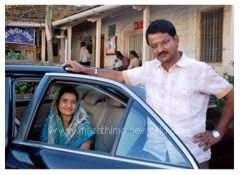
‘If there’s a will, there’s a way’. ‘Masala’ is an inspiring tale, which sends across a strong message to those people in Maharashtra, not to be discouraged by failure in business. If you are honest and working hard, there is always someone to take note of your sincerity. The film has been shot at realistic outdoor locations at different district places in Maharashtra. It cleverly portrays the picture of a hard working common man in Maharashtra, who begins with small business, but aspires to start his own big business soon.
Director Sandesh Kulkarni has shot one important scene very cleverly, when the couple is taken for a ride by the truck driver. When the couple reach Solapur, their struggle does not end there; even after finding the shelter at a relative’s place. Fortunately, their wavelength matches well with that of the host couple, who not only welcome them in their house by offering shelter, but also share their problems by working together to earn for their living.
Both- Girish Kulkarni and Amruta Subhash have played the ‘made for each other couple’ in a realistic manner. Watch those scenes of their struggle, while moving from one place to other. The wife is always ready to move with her husband, wherever he plans to go. Hrishikesh Joshi and Sneha Majgaonkar lend a good support. Some characters like the businessman and his wife- played by Dr. Mohan Agashe and Jyoti Subhash; add good support to the film’s script. At the same time, the scientist ( Dilip Prabhavalkar) seriously working on the production of fuel from Bio waste, not only brings some humour, but also goes on to show the social obligation. Dr. Shreeram Lagoo has just one scene, but in that role of Idrisbhai- dealer of scents, he goes on to show how important is trust in any business.
There is not much scope for songs in this film; but, one song with Karnataki touch has been composed very well by Anand Modak on the lyrics of Sunil Sukhtankar. Background music has been used well, with the help of music arranger Narendra Bhide. Cinematography by M.H. Ramachandran is something to be appreciated for capturing all those scenes in motion. Sandesh Kulkarni leaves a mark with his film direction on debut. He has succeeded in offering a tasty recipe to Marathi audience with his ‘Masala’.
‘Baboo Band Bajaa’ – a masterpiece
 |
Rating: 3.5
Banner: Jai Gajanan Productions Producer: Neeta Jadhav Director: Rajesh Pinjani Story: Shantanu Ganesh Rode Screenplay: Shantanu Ganesh Rode Cinematographer: Raja Phadatare Cast: Master Vivek Chabukswar, Usha Naik, Milind Shinde, Milatee Jagtap Varadkar, Chhaya Kadam, Master Amaan Attar, Sanjay Kulkarni, Vinod Raut, Mukund Wasule, Rajesh Bhosale, Rajesh More, Mahesh Ghag Movie Review by: Ulhas Shirke |
Planning Commission deputy chairman Montek Singh Ahluwalia defined Rs 32 per capita per day as poverty line and was criticized by the media and experts. Indeed, Mr. Ahuwalia, hasn’t seen the poverty in villages of Maharashtra. To get a better idea, he should watch Rajesh Pinjani‘s latest released Marathi film ‘Baboo Band Bajaa’. It is not only the earnings to eat the daily bread, but to manage the house and offer minimum education to the children and meet their medical expenses; that counts to decide the poverty line.
Set on the backdrop of a typical village in Maharashtra, the film revolves around one such family of Jaggu( Milind Shinde) , who plays band at weddings and funerals in the village. He shares his income with other three colleagues and sometimes uses his son Baboo( Vivek Chabukswar) , in absence of any one from the group. There was a time, when Jaggu owned his band in the name of his son ‘Baboo band Bajaa’. But, due to poverty and accumulation of debt, he has keep his instruments as security to the moneylender, against the loan.
Mitali Jagtap, Baboo Band Baja Jaggu’s son Baboo studies in 3rd standard in the village school, but he cannot even afford his school uniform. One day, his school bag is lost. Baboo gets thrashing from his father as well as schoolmaster, who sends him home. Jaggu wants Baboo to join his group, but his mother( Mitali Jagtap) does all odd jobs to earn extra, so as to offer education to her son. Baboo’s grandmother( Usha Naik) too wants her grandson to receive good education. One day, after attending to the labour pains of a woman from an upper class family, she requests the head of the family for job. She finds one as a contract labourer at a cotton depot. But, there too, the manager delays her payments.
The bad luck continues with the family, as the old woman too sits at the local market to sell essential items. Jaggu and his group suffer another setback, as the local politician plans community weddings, offering incentives to the newly wed couple. He also plans to invite a Big band group and photographers from the town to get maximum publicity. This results in unemployment for Jaggu as
well as local photographer. But, the local photographer, who marries Jaggu’s friend’s daughter (Namrata Awate) has some photos clicked of the politician’s secret deals. In return, he demands the contract for himself Jaggu’s group for the big event.
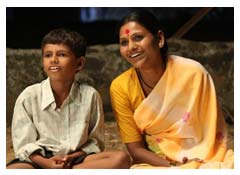
Everything seems to be going well, when another tragedy strikes the family. But, in spite of that loss, Baboo gets ready to attend his school and Jaggu gets back his instruments after repaying his loan. ‘Baboo Band Bajaa’ is a sensible film, which sends across a strong message on importance of education to rural children. The director has presented the subject with total sincerity, without paying much attention to unnecessary glamour or item numbers. From start to finish, he has focused his attention on the main issue; trying to explain how women in India are concerned about the education to their children.
The film has already won many awards at the film festivals, with the leading lady of the film – Mitali Jagtap Varadkar, having won the best actress national award last year. Undoubtedly, she has given an outstanding performance. The child artiste Vivek Chabukswar has displayed his extra ordinary talent, through the role of Baboo. Among the other artistes, Milind Shinde looks very natural and has given his best. But, others like Usha Naik, Namrata Awate and others have supported very well. It’s the good team work of the artistes and the technical people, which makes this film a masterpiece.
‘Mukti’ addresses farmers’ issue with a difference
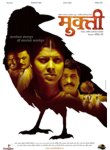 |
Rating: na
Banner: Placid Films Presenter: Sachin Shamrao Jankar Producer: Sachin Shamrao Jankar Director: Machhindra More Story: Machhindra More Screenplay- Dialogues: Machhindra More Cinematographer: Raja Phadtare Cast: Nandu Madhav, Tejaswini Pandit, Milind Shinde, Nagesh Bhosale, Satish Salagare, Prashant Neman, Gauri Kamble & Charvi Sangkholkar, Ajay Jadhav. Movie Review by: Ulhas Shirke |
In the recent past, few films like ‘Gabhricha Paus’ and ‘Pangira’ have already made a statement on farmer’s suicide and have succeeded in making the audience think about the existing situation in Maharashtra. They also blamed the corrupt system and the Government for their Agricultural policies. Now, Machhindra More through his latest directorial film ‘Mukti’ goes beyond the topic of suicides, to not only show how the family of the victim suffers in this so called corrupt state of India; but has shown some hopes to the farmers of this state, who form a sizable population.
‘Mukti’ is a tale of one such farmer Bhanudas (Nandu Madhav) living in a small village of Maharashtra, which is under drought prone area. The MLA of their area promises water from a dam located at a nearby place. But, Bhanudas alias Bhana (as he is popularly called) is not willing to wait. He is more eager to farm on his 12 acre land and tries his best to dig a well to arrange for water. He thinks big and on the advice of experts decides to use the blast method. Borrowing money from local moneylender Bhujang (Nagesh Bhosale )and taking loan from the bank, he goes ahead with his plans, only to fail in his mission. Dejected with the developments, he commits suicide, by jumping into the dry pit.
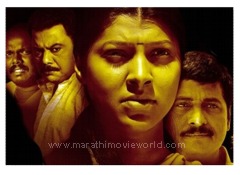
After her husband’s death, his wife Baijaa (Tejaswini Pandit) faces a tough challenge to look after her two school going children and old father-in law. She is also under pressure from the Moneylender to repay his loan or surrender herself before him. The local village Sarpanch (Milind Shinde) also plays all the tricks to come close to her, under the pretext of getting the compensation for her.
‘Mukti’ shows all those hardships, a helpless widow has to undergo, after her husband’s death. The film’s screenplay keeps on reminding all those male folks, as to how difficult the life would become for their family, in case they commit suicide.
Things change in the village, in just two years time, after Baija leaves the village with her two children, to escape humiliation at the hands of the moneylender and the village headman. Surprisingly, the film shows better image of the MLA, at a time, when we are witnessing the scams of politicians in Maharashtra. But, as they say, not all politicians are corrupt. The film has however blamed the system comprising of Talathi, tahsildar and the people working in such government offices. Without a bribe, you cannot get the work done. Even to get Rs. One lack compensation released, Baija is told to pay a bribe of 75% of the dues to her, declaring the share of all the Government officers including collector. The climax focuses attention on the Budget of Central Government, where the FM announces waiver of loans by farmers and a new policy to abolish the Moneylenders in villages.
The MLA himself, announces the release of water from the dam through a canal for the village, following which, the news about Baijaa and her children begging at a nearby town reaches the retired schoolmaster. But, the film does not end after return of Baijaa and her children to their village. She has to follow the rituals by offering food to the crow to liberate her husband’s soul. And, this time, the crow does come to eat the food offered. The director begins his film, narrating the significance behind this ritual through animated version, which relates to the happening at the end, when the film concludes with a meaningful poem.
‘Mukti’ is just not the another film on Farmer’s suicide; as it does not only present the dark side but also constantly reminds those farmers, about the repercussions of such drastic steps taken by them. It shows the hope, besides reminding the administration of their lapses. The film does create the required humour into this otherwise serious tragic tale, through the comedy character of Bajaa, played by Ajay Jadhav. Nadu Madhav has played his role with sincerity and so does Tejaswini Pandit, with her fine performance. Having played the character of Sindhutai Sapkal, she looks more confident, playing a village woman in distress. Milind Shinde, Nagesh Bhosale, Satish Salagare, Prashant Neman, Gauri Kamble &Charvi Sangkholkar have done their best in supporting roles. Music does not have much scope in this film, but B.A. Tupe’s music suits well to the village backdrop.
‘Chirgut’ revolts against the corrupt system
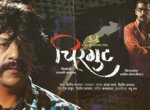 |
Rating: na
Banner: J. R. D. Entertainment Producer: Rajshree Jagtap Director: Pradeep Ghonsikar Story: Dilip Jagtap Screenplay- Dialogues: Sanjay Pawar, Dilip Jagtap Cinematographer: Madhu Rao Cast: Upendra Limaye, Chinmay Mandlekar, Siya Patil, Madhav Abhyankar, Sanjay Kulkarni, Pramod Shinde, Dr. Sharad Bhutadia and Ajit Bhagat Movie Review by: Ulhas Shirke |
Corruption is spreading like a cancer in the society and the main victims are the laborers and the neglected class, who live in the slums. Today, under the name of ‘Slum Rehabilitation Projects’ the builders with the help of local leaders, are exploiting the slum dwellers. The latest Marathi film ‘Chirgut’, (which means a worn out cloth piece) has been shot on the backdrop of a real existing slum off. Mumbai, where you find the concentration of people belonging to the most neglected community including Eunuch and prostitutes. The hero of this film Nagya (Upendra Limaye) an orphan, has been brought up by one such Eunuch (Ajit Bhagat).
The film has a hard hitting subject with Nagya educating the people from his slum colony, about their rights. He also dares to challenge the local MLA, when the latter approaches him with an offer. Watching Nagya’s stand against the corrupt system, Jahnavi ( Siya Patil) a student of Sociology from a Management Institute, is highly impressed. She talks to her close friend and project partner Vijya (Chinmay Mandlekar) about Nagya’s mission; but, he discourages her, saying that he had closely observed Nagya since his college days and that he would not be able to carry forward his fight. But, Jahnavi takes her own decision and leaves her college project to join Nagya’s movement. She is also joined by other two friends. Finally, when Vijya realizes that his professor is also working on the directions of the Government, he too joins their group.
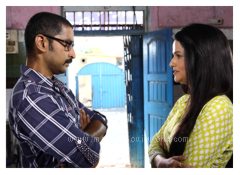
Their movement spreads to other parts of Maharashtra, where people exploited by politicians and builders unite under their leadership. As a result of this, the chief Minister, a look alike of the present chief Minister of Maharashtra, orders inquiry against
some of his team members and bows down before the demand of the revolutionaries. The film has hard hitting dialogues by Sanjay Pawar and Dilip Jagtap, to create the conflict between Policy makers and slum dwellers.
The film did possess the content to expose the system, but it failed in the concluding part. The reason for which Nagya opens his fight, i.e. to hand over the rights to the people actually leaving in the slums, to develop their area; does not produce desired results in the end. It would have been better, if the director had concluded the film, showing the Slum rehabilitation rights given to Nagya and his associates. It would have sent a strong message to our policy makers and selfish politicians, who play hand n glove game with builders.
The film has clearly shown the MLA of ruling party and the opposition leader coming together, fearing about the sudden rise of such third front led by Nagya. In fact, the film has been targeted at such underprivileged people living in slums, reminding them about their rights. It also inspires them to form their own front, to seek their privileges. National award winning actor Upendra Limaye has given his best in the role of Nagya, which is almost a one man show. In the supporting cast Chinmay Mandlekar and Siya Patil find few scenes to make their presence felt. Other artistes like Madhav Abhyankar as the Professor, Dr. Sharad Bhutadia as opposition leader, Ajit Bhagat as Eunuch and Pramod Shinde as chief Minister have done well. Pradeep Ghonsikar’s direction is good in some of the important scenes but in the climax, he fails to create that desired impact, as the last scene has been dragged with the speech of Nagya. However, the sincere effort of the director to present this social issue in a cinematic format, is to be appreciated.
‘Teen Baika Fajiti Aika’ – a masala stuffed comedy
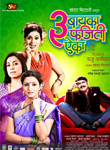 |
Rating: na
Banner: Sai Shankar Films Producer: Shankar Mitkari Director: Raju Parsekar Story: Rajan Agrawal Screenplay: Arvind Jagtap, Dilip Yadaw Cinematographer: Abdul Wahab Cast: Makarand Anaspure , Kranti Redkar , Nisha Purulekar , Tejshree Khele , Surkha Kutchi , Vijay Chavan, Kuldip Pawar , Singers: Anand Sinde , Reshma Sonvane, tyagaraj Khadilkar, Eknath Mali Movie Review by: Ulhas Shirke |
At a time when Marathi films are winning the national awards for their realistic sensible presentation, the wave of comedy films hasn’t stopped. Now, coinciding with the new Maharashtian year, we find one Masala stuffed comedy film, made by veteran director Raju Parsekar. Being well versed with the art of film making at the commercial level, the director has picked up this time a subject based on marital relations, where the husband belonging to a traditionally rich family from a village, is required to marry another woman with the kind permission of his first wife.
Makarand Anaspure who plays the 32 year old son- Vishwasrao of a deceased landlord of a village, is already married to Madhavi ( Nisha Parulekar), but the couple has no issue after 5 years of marriage. So the mother-in-law does not leave any opportunity to taunt her daughter in law. One day, when the family attend a wedding of a close family friend’s daughter- Prajakta ( Kranti Redkar) , they find the Bridegroom deserting his would be wife, over dowry issue. As per the village tradition, this is considered inauspicious for the girl. So, Vishwasrao’s mother, who is present there, suggests her son to marry the girl, to fulfill her wish of getting a heir to her family. When Madhavi also agrees for the same, Prajakta arrives at home. Both the girls get along well with each other; but they don’t find time for Vishwasrao. So, to teach them a lesson, Vishwasrao hires a girl, to pose as his girlfriend.
But, his live in show off relationship with the new girl – Pari ( Tejashree Khele), invites a new problem for him. The Police officer( Kuldeep Pawar) , who is under Vishwasrao’s obligation, keeps on coming and going to create the required humour in the screenplay. Finally, the film ends with a climax, in a typical Priyadarshan style comedy. Director Raju Parsekar realizing the potential of Makarand Anaspure to play such a character, has used his timing very well, whether it was with Kranti, Nisha or Tejashree. But, his interaction on three occasions with Kuldeep Pawar, creates the required humour in this fast paced film.
Most of the sequences in the film are picturised on Chiranjivi style Telugu films. But, the base being Maharashtra, the director has not deviated from the typical semi urban culture in the state. Some of the local idioms and phrases have been timed well in the screenplay by Arwind Jagtap. Therefore, if the audience decide to forget their logical thinking process, the film is good enough to entertain them for little more than two hours. The focus of the film maker seems to be on getting good collections from single screen theatres at district places like Pune, Nashik, Kolapur, Satara, Nagpur and other places in Western Maharashtra.
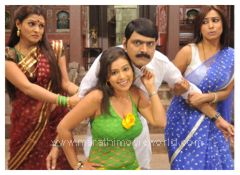
The leading man of the film Makarand Anaspure has played the flamboyant Vishwasrao in his typical style. Suited to his rich family character background, he is also shown wearing some designer tops. Surekha Kudchi perfectly fits into the character of his mother with authority. Vijay Chavan makes his special appearances through the photo frame to remind his wife about his last wish. His son Varad Chavan has a small negative role. All the three leading ladies have equal share to their credit and have done a good job. Kranti in particular has timed her mimicry well besides usage of broken English . The new girl Tejashree makes her surprise entry at the stroke of interval. She too has done her job well in the company of all known artistes. Perhaps, her exposure to south films has come to her advantage. Among the other artistes, Digamber Naik and the girl playing the maid servant-Madhuri have done their jobs well.
Music and Camera are the plus points of this film. Photography by Wahab is good . All the five songs are well timed. The already popular Rikshawala song has been cleverly picturised on Manasi Naik, who is now experienced enough to perform such item numbers. But, if the audience is keen on watching this item number, they should not miss the beginning of the film, as the song forms part of first ten minutes of the film. As a director, Raju Parsekar has done a fairly good job to offer entertainment with U/A crertification, compared to what he offered in the films like ‘Durga Mhantyat Mala’ and ‘Tata Birla Ani Laila’ in the recent past.
‘Kaay Karu? Na Kasa Karu !’- Just another average comedy
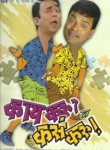 |
Rating: na
Presenter: G V Films, Balgiri Director: Vinay E Laad Story: Vinay E Laad Screenplay: Vinay E Laad Dialogues: Sanjay Belose Cinematographer: Anil Khandekar Music: Nishikant Sadafule Art: Rashid Rangrez Cast: Bharat Jadhav, Deepali Sayyed, Pushkar Shrotri, Aditi Sarangdhar, Vijay Chavhan, Uma Sardeshmukh, Jyoti Joshi, Ashok Shinde, Movie Review by: Ulhas Shirke |
You never know, when and how our Marathi film makers would get inspired to make comedy films on the lines of some old Bollywood movies. Perhaps, watching those repeat runs of David Dhavan films starring Govinda and Sanjay Dutt on television, might have influenced director Vinay Laad to write the story of this Marathi film ‘Kaay karu? Na Kasa karu!’ starring Bharat Jadhav and Pushkar Shrotri in the lead. Only changes he made, by replacing Jay Paaji and Veeru Paaji with Vijay and Ajay; as otherwise both are shown as con men, in search of easy money and accommodation.
Vijay feels that he can compose music while Ajay, who sells ayurvedic jadi butti, poses himself as a doctor owning a hospital. So, they play pranks on the lines of what Govinda and Sanjay Dutt did in either ‘Jodi No. 1′, ‘Haseena Maan Jayegi’, or ‘Ek aur Ek Gyarah’. If that was not enough, they also borrow few ideas from Harmesh Malhotra’s Bollywood films of 90s.
With few changes here and there, the plot of ‘Kaay Karu? Na Kasa Karu!’ begins with two close friends – Vijay (Bharat Jadhav) and Ajay (Pushkar Shrotri), who are shown literally on the roads in the beginning of the film, after being shown the door by their landlord. They meet their common friend Kamlya (Kamlakar Satpute) who is influenced by Mr. Bachchan and keeps on overdoing his past film acts uttering Hindi dialogues, more than required to create humour.

Kamlya introduces his two friends to a Watchman of a bungalow (Vijay Chavan), who is guarding his Owner’s bungalow for a period of six months, since the owner is away. In the meanwhile the watchman’s two daughters Nisha (Deepali Sayyed) and Usha (Aditi Sarangdhar) also manage to enjoy the luxury of this bungalow. When Kamlya introduces Vijay and Ajay as an upcoming Music director and a doctor owning hospital respectively, the girls are impressed by their status and fall in love with them, in the first meeting itself. Their mother (Uma Sardeshmukh) is not very happy with their association with strangers, but the father plans
something big; and soon gets his both the daughters married to them.
When, it is disclosed that the two young men are fraud, he repents. But, destiny makes them extra smart and they manage Rs.5 cores, after they save life of a rich man about to commit suicide. Then begins the naughty games of two boys, to teach a lesson to their demanding wives. Finally, it’s happy ending in the climax. There is no doubt that the chemistry between the two couples works well; but the outdated song sequences and not so appealing music do not go well with the screenplay.
All the four leading artistes have given their best, as expected. Ashok Shinde plays an awkward looking role, where he has no scope; but only to expose his skin affected face and receiving insults from Deepali. Vijay Chavhan and Uma Sardeshmukh play the parents convincingly. Few dialogues are well written by Sanjay Belose; but some of them are repeated by Kamlakar Satpute – the character of Kamlya, while performing his mimicry and by Deepali while humiliating Ashok Shinde. There are no twists and turns in the screenplay, except for the routine comedy on one given plot. Anil Khandekar’s photography is good, but there is nothing special in the choreography of Dilip Mistry. In the process, Writer- Director Vinay Laad has offered just another average entertaining Marathi comedy film.